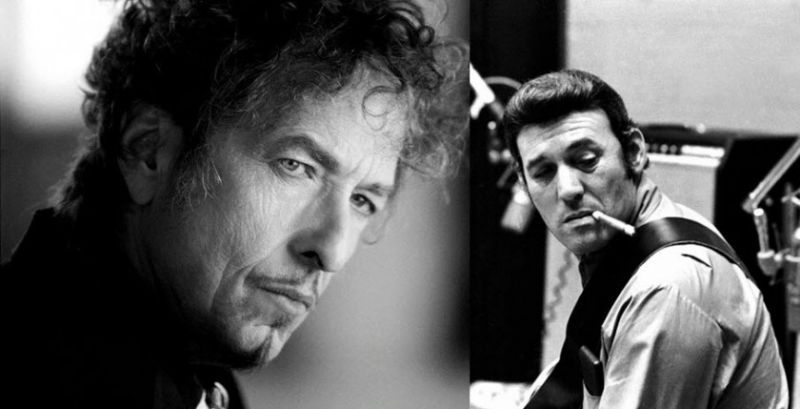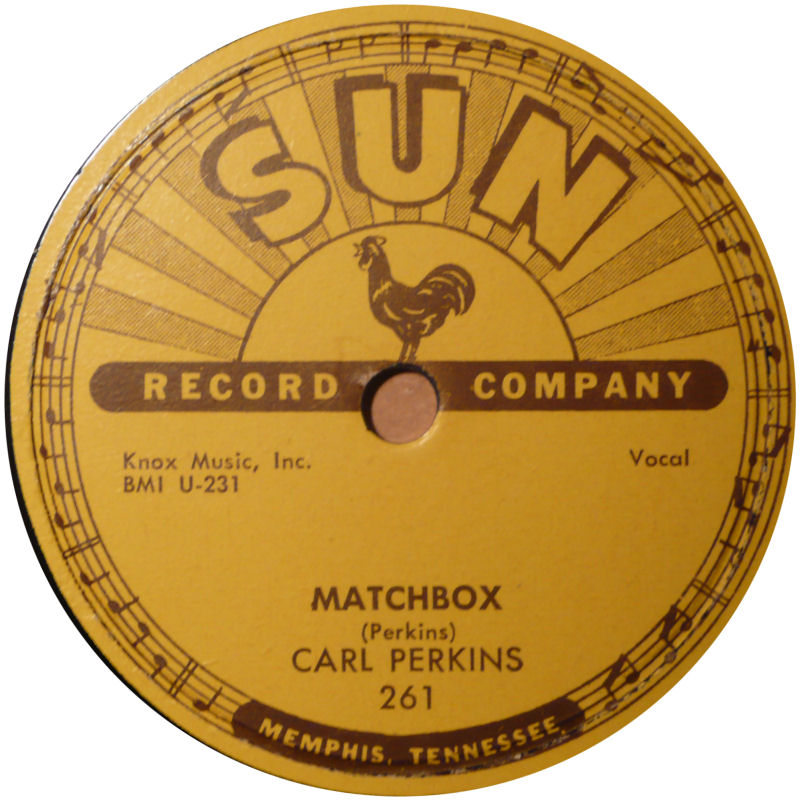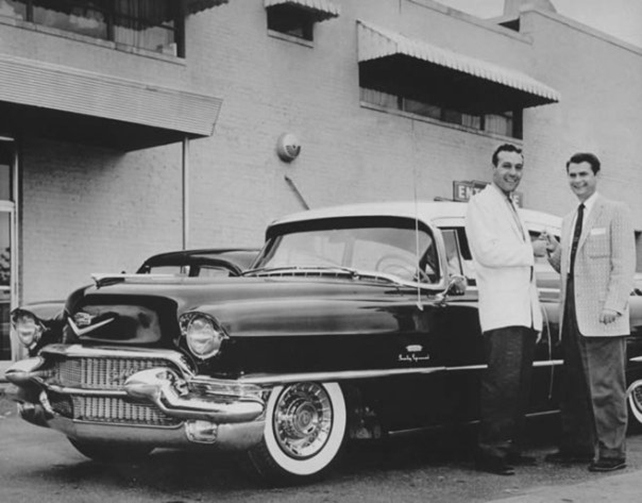Well I’m sitting here wondering, will a matchbox hold my clothes
Yeah I’m sitting here wondering, will a matchbox hold my clothes
I ain’t got no matches, but I got a long way to go
I’m an ol’ poor boy and a long way from home
I’m an ol’ poor boy and a long way from home
Guess I’ll never be happy, eveything I do is wrong, yeah
| He [Carl Perkins] really stood for freedom. That whole sound stood for all degrees of freedom. It would just jump off the turntable… we wanted to go where that was happening. ~Bob Dylan (note from Dylan @ Carl Perkins funeral) |
Wikipedia:
| Released | 1957 |
|---|---|
| Format | 7″ Vinyl |
| Recorded | December 4, 1956 |
| Genre | Rockabilly |
| Length | 2:10 |
| Label | Sun Records |
| Writer(s) | Carl Perkins |
| Producer | Sam Phillips |
“Matchbox” is a rock and roll and rockabilly song written by Carl Perkins and first recorded by him at Sun Records in December 1956 and released on February 11, 1957 as a 45 single on Sun Records as Sun 261. It has become one of Perkins’ best-known recordings. Perkins’ “Matchbox” has been followed by many cover versions, notably by the Beatles.
After recording “Your True Love”, Carl Perkins’s father Buck suggested that he do “Match Box Blues”. Buck knew only a few lines from the song, either from a 1927 recording by Blind Lemon Jefferson, or from the version by country musicians The Shelton Brothers (who recorded the song twice in the 1930s, and again in 1947). As Perkins sang the few words his father had suggested, Jerry Lee Lewis, who was at that time a session piano player at Sun Studios, began a restrained boogie-woogie riff. Carl began picking out a melody on the guitar and improvised lyrics. On December 4, 1956 Carl Perkins recorded the song called “Matchbox”. Later that day, Elvis Presley, Johnny Cash, and session pianist Jerry Lee Lewis were all in the Sun studio with Sam Phillips. The impromptu group formed at this jam session became known as the Million Dollar Quartet.
Perkins maintained that he had never heard Jefferson’s “Match Box Blues” when he recorded “Matchbox”. Jefferson’s song is about a mean spirited woman; Perkins’ was about a lovelorn “poor boy” with limited prospects.
Other notable versions
Carl Perkins – live TV Performance 1957:
Jerry Lee Lewis – live Star Club Hamburg 1964:
Ronnie Hawkins & Duane Allman:
The Beatles – Matchbox (2014 Stereo Remaster)
Paul McCartney – live:
Eric Clapton, Carl Perkins, Johnny Cash:
Well let me be your little dog, ’till your big dog comes
Let me be your little dog, ’till your big dog comes
When the big dog gets here, tell him what this little puppy done
Yeah I’m sitting here wondering, will a matchbox hold my clothes
Yeah I’m sitting here wondering, will a matchbox hold my clothes
I got no matches, got a long way to go
Let ‘er go boy, go-go
–
Bob Dylan
Columbia Studio A
Nashville, Tennessee
18 February 1969
5th Nashville Skyline session, produced by Bob Johnston.
- Bob Dylan (vocal, guitar & harmonica)
- Johnny Cash (shared vocal)
Palomino
Hollywood
Los Angeles, California
19 February 1987
Guest Appearance at a Taj Mahal concert.
- Taj Mahal (vocal & harmonica)
- George Harrison (Vocal & guitar)
- Jesse Ed Davis (guitar)
- Bob Dylan (guitar)
- Wayne Henderson (keyboards)
- Ray Fitzpatrick (bass)
- Kester Smith (drums)
Oman Auditorium
Jackson, Tennessee
10 November 1994
- Bob Dylan (vocal & guitar)
- Carl Perkins (vocal & guitar)
- Bucky Baxter (pedal steel guitar & electric slide guitar)
- John Jackson (guitar)
- Tony Garnier (bass)
- Winston Watson (drums & percussion)
Check out:
- Bob Dylan – The songs he didn’t write
- –
- Bob Dylan cover versions @ Alldylan
- Bob Dylan albums @ Alldylan
- Bob Dylan videos @ Alldylan
- Bob Dylan concerts @ Alldylan
- Bob Dylan recording sessions @ Alldylan
-Egil




just realized how much i love this song this past week. thanks for all the great versions!
It’s a SUN classic! Love it.
Egil
The jerky little leg movements in Carl Perkins’ solo performance ( live 1957 videoclip ) reminds me of Dylan’s own little song-and-dance numbers, the movements depending on his mood to lay emphasis on certain parts of the lyrics.